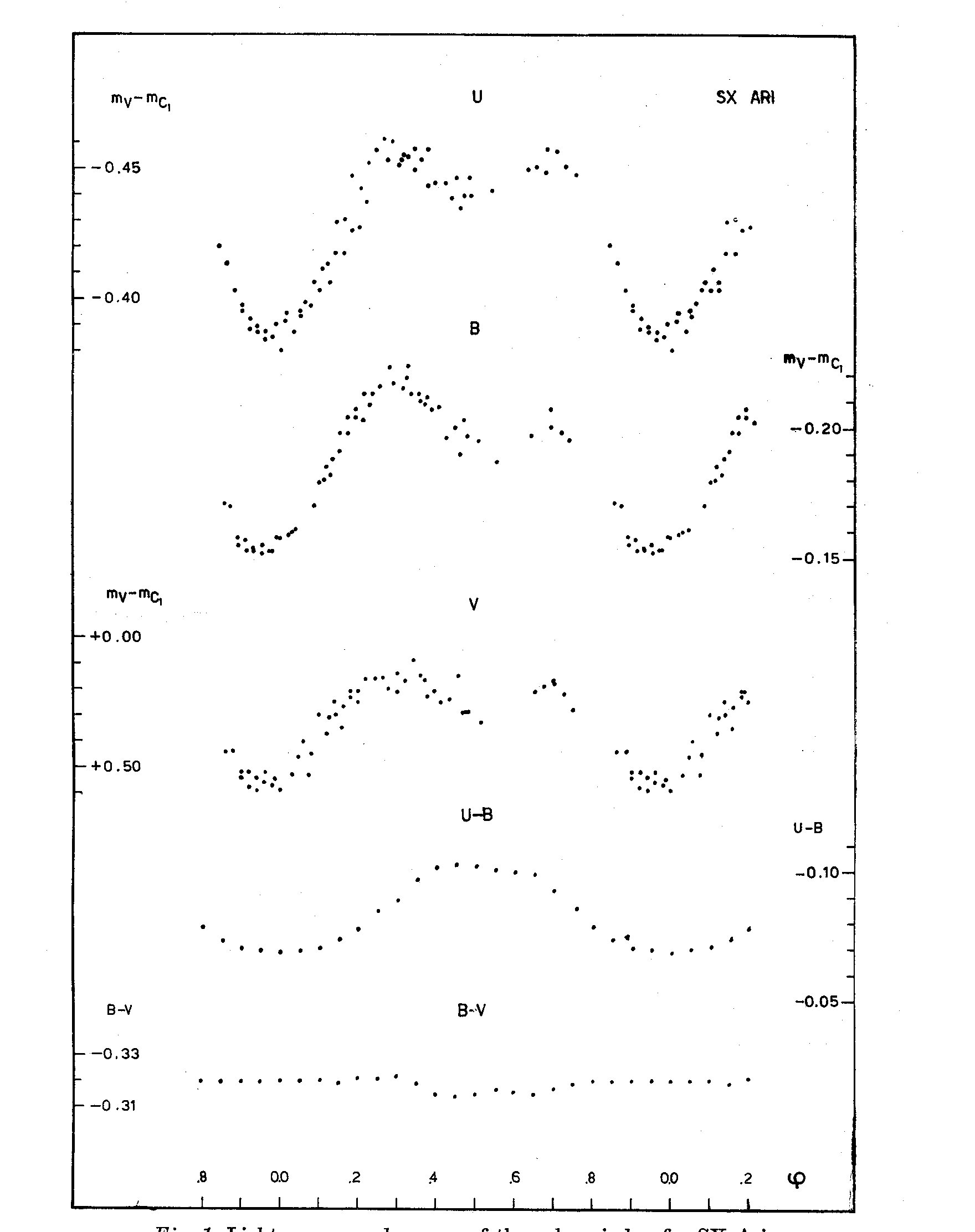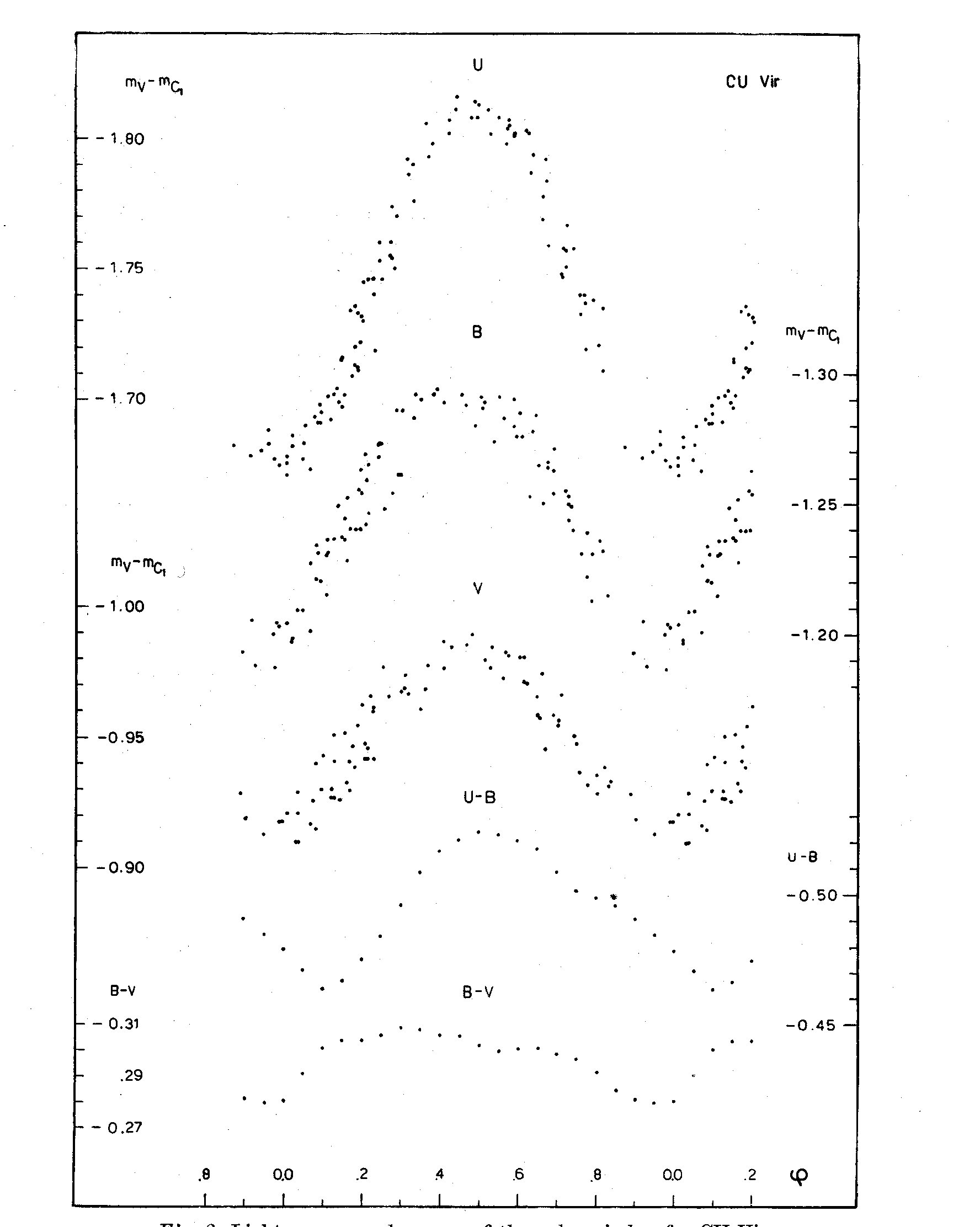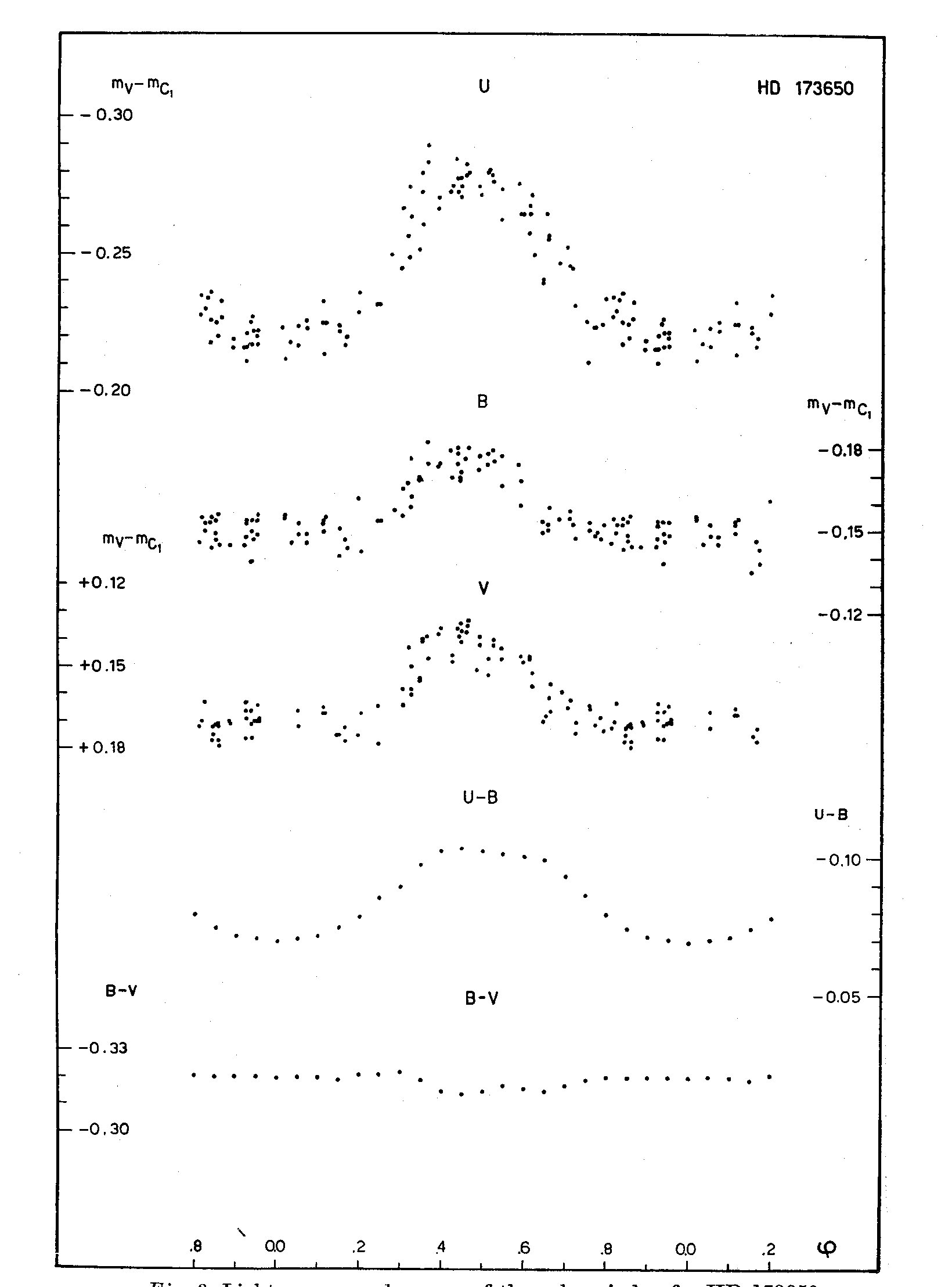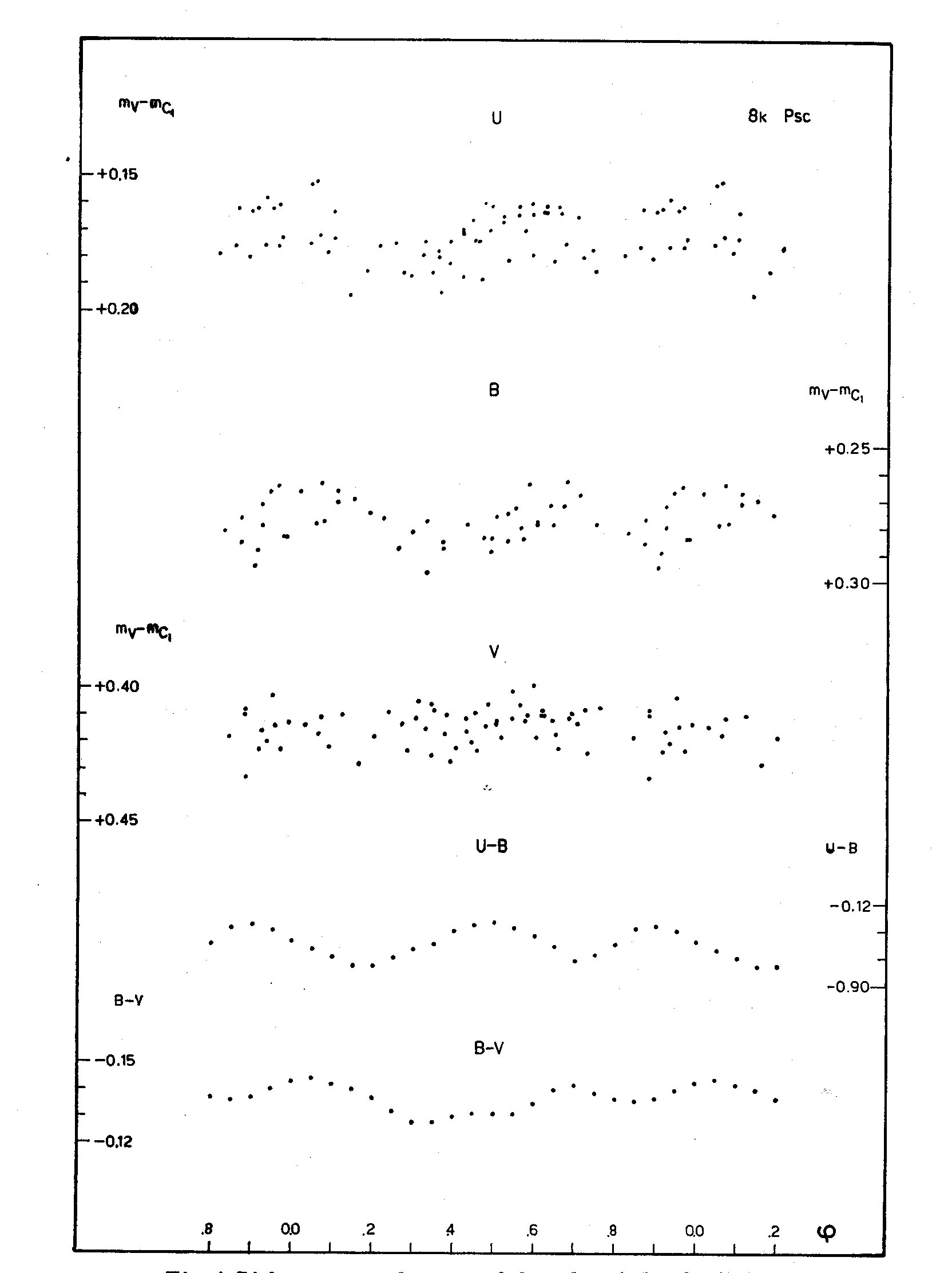Non-Periodic Phenomena in Variable Stars
IAU Colloquium, Budapest, 1968
PHOTOMETRIC RESEARCH ON MAGNETIC STARS AT THE CATANIA
ASTROPHYSICAL OBSERVATORY
C. BLANCO, F. CATALANO, and G. GODOLI
Catania Astrophysical Observatory, Italy
SUMMARY
The results recently obtained at Catania from the observations of the magnetic
stars SX Ari, 41 Tau, CU Vir, HD 173650, HD 184905, HD 219749, 8k Psc,
HD 224801 are summarized.
INTRODUCTION
In 1967 systematic photoelectric observations of magnetic variables
were started at the Catania Astrophysical Observatory. These observations
have been undertaken in the course of the Catania research programme on stellar
activity of solar type (Godoli, 1967, 1968). Some results have already been
published (Blanco and F. Catalano 1968; Godoli 1968). Here the observations
made and the results obtained until August 1968 will be summarized.
OBSERVATIONS
The instruments used for the observations are a 91 cm and two 30 cm
(distinguished by N and S) conventional Cassegrain reflectors (Fracastoro
1967).
The characteristics of the stars observed (August 1968) according to
the Ledoux and Renson Catalogue (1966) and of the instruments used are
reported in Table 1. The stars observed have periods of 0.5 to 12 days.
The photoelectric observations have been carried out in the three
colours U, B, V. For each colour, sequences of measurements were made in
the order S C_1 S V S V S C_2 S C_1 S (S indicates the sky, C1 and C2
the comparison stars, V the variable under study), every measurement lasting
one minute. Such a sequence was used since we were interested in the small
(short period or secular) variations of these stars.
The comparison stars are listed in Table 2.
The observations are corrected for atmospheric extinction using a
statistically determined mean absorption coefficient. The data are elaborated
by the IBM computer of the Faculty of Sciences of Catania University.
In Table 3 the sequences obtained in the U, B, V bands until August 31 are
reported for every star.
METHOD OF REDUCTION
First of all, the diagrams m_c1 - m_c2 versus JD have been plotted in
order to control the constancy of the comparison stars C_1 and C_2. All the
observations for each star are plotted in a diagram m_v-m_c1 versus JD for
each colour.
Table 1
Characteristics of the observed magnetic stars (August, 1968), according to the Ledoux
and Renson Catalogue (1966) and the instruments used
Coordinates Delta m
Magnetic star (1950) m_v Sp. Period days Instrument
R. A D. B V
HD 19832 3h 09.3m +27deg 04' 5.7 0.06 0.04 B8pV 0.7279 30 N
(SX Ari)
HD 25823 4 03.5 +27 28 5.2 0.03 0.035 A0pV 11.9 30 N
(41 Tau)
HD 124224 A 14 09.7 + 2 39 4.9 0.08 0.07 B9pV 0.52067 30 N
(CU Vir)
HD 173650 18 43.5 +21 56 6.4 - - A0pV 10.1 30 S
(BD +21 3550)
HD 184905 19 33.2 +43 50 6.6 - - A0pV 1-2 91
(BD +43 3290)
HD 219749 23 15.6 +45 13 6.3 0.03 0.02 B9pV 0.723 30 S
(BD +44 4373)
HD 220825 23 24.4 0 59 4.9 0.020 0.015 A2p 0.58 30 N
(8k Psc)
HD 224801 23 58.2 +44 58 6.3 0.03 0.05 A0pV 3.74 91
(BD +44 45)
Table 2
Comparison stars
C_1 C_2
Magnetic star
comparison star m_v Sp. comparison star m_v Sp.
HD 19832 HD 19548 5.62m B7V HD 19600 6.36m A0V
(SX Ari)
HD 25823 HD 25867 5.32m dF1 HD 26322* 5.40m dF3
(41 Tau) HD 25626** 7.9m A2
HD 124224 A HD 121607 5.86m A3 HD 125489 6.14m A3
(CU Vir)
HD 173650 HD 173494 6.10m dF5 HD 174160 5.68m F5
HD 184905 BD +42 3386 5.8m A BD +41 3398 7.0m A
HD 219749 HD 219891 6.40m A2 HD 219668* 6.40m sgK0
BD +44 4421** 7.0m A
HD 220825 HD 222603 4.52m A7V HD 221950 5.60m dF0
(8k Psc)
HD 224801 HD 224559 6.52m B3IV BD +45 4363* 6.7m B
(CG And) BD +46 4231** 7.0m A
* For the observations made during 1967.
** For the observations made during 1968.
The curves m_v-m_c1 versus phase phi have been deduced from these diagrams.
For this deduction previous values of the period, when available, have been
taken into account.
From m_v-m_c1 versus phase (phi) curves the normal points have been
calculated in order to determine the U - B and B - V colour index curves.
When possible we have plotted the diagram m_v - m_c1 versus phi doubling the
period.
Table 3
Number of observations in the three colours in the order U, B, V
Magnetic star Number of observations for different nights
SX Ari 1967/XI 2(11; 10; 9), 9(4;4;3), 10(4;3;3), 14(20;18;18), 22(3;3;2),
24(10;9;9).
1967/XII 7(7;6;6), 16(3;3;0),17(3;2;2), 29(2;1;1).
41 Tau 1967/X 28(2;2;2).
1967/XI 9(1;2;2), 14(1;1;1),24(2;2;2).
1967/XII 3(1;1;1), 7(3;3;3).
1968/I 29(1;1;1), 30(4;5;4).
1968/III 1(4;4;0), 19(1;1;0).
CU Vir 1968/II 26(3;3;3).
1968/III 1(3;2;2), 18(6;5;4), 21(3;3;2), 23(6;6;7), 25(8;8;7), 28(7;6;6).
1968/IV 5(9;7;7), 6(1;1;1), 8(6;5;4), 18(7;7;6), 22(3;3;3), 23(5;5;4),
24(1;2;1), 30(2;2;1).
1968/V 4(2;3;1), 16(4;4;4), 17(6;5;6), 18(8;8;8),21(3;2;2), 27(4;3;3).
1968/VI 3(2;2;1), 8(1;0;0), 13(3;2;2), 15(1;1;0).
HD 173650 1967/VII 11(1;1;0), 15(2;2;2), 18(1;1;1),20(1;1;1), 22(3;3;3), 24(2;2;2),
25(2;2;2), 26(2;2;2), 27(2;2;2),28(2;2;2).
HD 173650 1967/VIII 1(1;1;1), 2(2;1;2), 3(1;1;0), 6(2;2;1), 7(2;2;2), 8(2;2,2),9(1;0;0),
10(2;1;2), 12(2;2;2), 13(1;1;0), 14(2;2;2), 18(0;2;2), 19(4;0;4),
20(1;2;2), 24(2;2;2), 25(2;2;2), 26(2;2;2), 27(2;2;2), 28(2;2;2),
29(2;2;2), 30(1;1;1), 31(2;2;2).
1967/IX 1(2;2;1); 5(1;1;0), 8(1;2;1), 10(2;2;2),13(1;2;0),16(2;1;2),17(2;1;2),
19(2;2;2), 20(2;2;2), 21(2;2;2), 22(2;2;2), 26(2;2;2), 27(2;2;2),
28(2;1;2), 29(2;2;2), 30(2;2;2).
1967/X 1(2;2;0), 2(2;2;2), 7(2;2;2), 11(2;2;1), 12(2;2;2), 16(2;2;2), 21(2;2;2)
22(2;2;0), 23(1;1;0), 29(1;0;0).
1967/XI 3(2;1;0).
HD 184905 1967/VIII 18(4;4;4), 19(5;5;5), 20(5;4;5), 21(2;2;2), 24(5;5;5), 25(4;4;3),
30(4;4;4).
1967/IX 1(7;7;6).
1968/VII 9(4;4;5), 10(7;6;6), 12(8;8;8), 19(8;7;7), 20(7;9;8), 21(5;5;5),
27(2;2;2), 30(3;3;3), 31(9;9;9).
1968/VIII 2(4;4;4), 10(1;0;0), 14(1;1;1), 17(6;6;6), 18(4;4;4), 19(8;8;8).
HD 219749 1967/IX 17(10;11;8), 19(6;5;5), 20(7;7;7), 21(8;8;8), 22(2;1;2), 23(7;6;6).
1967/X 13(5;5;3), 16(2;1;1), 21(7;7;7), 22(11;11;0), 28(3;3;3), 9(9;9;9),
14(8;7;7).
HD 219749 1968/VII 15(5;5;5), 18(4;4;4).
8k Psc 1967/IX 7(5;5;4), 20(2;2;2), 21(2;0;1), 23(9;0;9), 26(6;4;6), 27(9;9;9),
28(6;6;6), 29(8;8;8).
1967/X 1(2;2;2), 2(2;2;2), 11(2;2;2), 13(5;5;5), 16(6;0;6).
HD 224801 1967/IX 7(2;1;2), 15(1;1;1), 17(7;6;7), 19(3;2;2), 20(4;3;3), 21(6;5;5),
22(1;0;1), 23(9;10;9), 26(6;6;5), 27(4;4;4), 28(1;2;1).
1967/X 11(4;4;4).
1967/XI 2(4;3;3), 3(1;1;1), 4(6;5;6), 5(3;3;3), 9(6;5;6), 14(4;2;7), 15(5;5;5),
18(1;0;0), 22(2;2;2), 24(5;5;5).
1967/XII 7(2;2;2).
RESULTS
1. Comparison stars
For the magnetic stars 41 Tau, HD 219749 and HD 224801 the comparison
stars show variations larger than the usual dispersion. For this reason
a third comparison star, C_3 was chosen for the 1968 observations.
2. Periods
SX Ari: Our observations are in agreement with the epoch and period
given by Provin (1953). According to our observations:
Min. light = JD 243 9792.49 + 0.7279d E.
CU Vir: Our observations are in agreement with the epoch and period
given by Hardie (1958). According to our observations:
Min. light = JD 243 9887.56 + 0.52068d E.
HD 173 650: Starting with the epoch given by Wehlau (1962) an epoch
for our observations and a new period have been obtained:
Min. light = JD 243 9685.82 + 10.1353d E.
HD 219 749: Our observations are not complete at present, but the best
agreement is found for the period of 2.604d given by Rakos (1962).
Light curves of all the other stars are not completely studied at present.
The period of 8k Psc is difficult to determine, because of the very small light
variations.
3. Light curves
The light curves and the curves of the colour indices for the completely
observed stars are reported in Figs 1-4.
For all the stars observed, the maximum variation of luminosity occurs
in the U light. We did not notice any displacement of the phase of the maxima
in different colours. For all these stars the U - B curves are in phase with
the light curve, except for CU Vir, where the minimum of the U - B curve
shows a displacement of 0.1 P.
We noticed for none of the stars short period or secular variations.
No peculiarity for any star has been found for odd and even cycles.
4. Comparison between light curves and magnetic curves
We have only for HD 173 650 the magnetic curve. For this star the
light curve is in phase with the curve of the magnetic field given by Wehlau
(1962).
 Fig. 1. Light curves and curves of the colour index for SX Ari
Fig. 1. Light curves and curves of the colour index for SX Ari
 Fig. 2. Light curves and curves of the colour index for CU Vir
Fig. 2. Light curves and curves of the colour index for CU Vir
 Fig. 3. Light curves and curves of the colour index for HD 173650
Fig. 3. Light curves and curves of the colour index for HD 173650
 Fig. 4. Light curves and curves of the colour index for 8k Psc.
5. Summary
The periods and Delta m values deduced from our observations are compared
with those from the Ledoux and Renson Catalogue in Table 4.
Table 4
Periods and Delta m according to the Ledoux and Renson Catalogue and according to our
observations
Delta m
P
Star U B V
L & R our obs. our obs. L & R our obs. L & R our obs.
SX Ari 0.7279 0.7279 0.08 0.06 0.06 0.04 0.05
41 Tau 11.9 - - 0.03 - 0.035 -
CU Vir 0.52067 0.52068 0.14 0.08 0.09 0.07 0.07
HD 173650 10.1 10.1353 0.06 0.039 0.03 0.045 0.04
HD 184905 102 ? - - - - -
HD 219749 0.723 2.604 0.07 0.03 0.035 0.02 0.02
8k Psc 0.58 0.58 0.025 0.007 0.02 0.012 0.015
HD 224801 3.74 - 0.08 0.03 0.05 0.05 0.07
REFERENCES
Blanco, C., Catalano, F., 1968, Mem. Soc. astr. ital., 39.
Fracastoro, M. G., 1967, Oss. astrofis. Catania Pubbl. No. 107.
Godoli, G., 1967, Oss. astrofis. Catania Pubbl. No. 115.
Godoli, G., 1968, In "Mass motion in Solar flares and related phenomena"
IX Nobel Symposium, Anacapri.
Hardie, R., 1958, Astrophys. J., 127, 620.
Ledoux, P., Renson, P., 1966, A. Rev. Astr. Astrophys., 4, 293.
Provin, S. S., 1953, Astrophys. J., 118, 281.
Rakos, K., 1962, Lowell Obs. Bull., 5, 227.
Wehlau, W., 1962, Publ. astr. Soc. Pacific, 74, 137.
Fig. 4. Light curves and curves of the colour index for 8k Psc.
5. Summary
The periods and Delta m values deduced from our observations are compared
with those from the Ledoux and Renson Catalogue in Table 4.
Table 4
Periods and Delta m according to the Ledoux and Renson Catalogue and according to our
observations
Delta m
P
Star U B V
L & R our obs. our obs. L & R our obs. L & R our obs.
SX Ari 0.7279 0.7279 0.08 0.06 0.06 0.04 0.05
41 Tau 11.9 - - 0.03 - 0.035 -
CU Vir 0.52067 0.52068 0.14 0.08 0.09 0.07 0.07
HD 173650 10.1 10.1353 0.06 0.039 0.03 0.045 0.04
HD 184905 102 ? - - - - -
HD 219749 0.723 2.604 0.07 0.03 0.035 0.02 0.02
8k Psc 0.58 0.58 0.025 0.007 0.02 0.012 0.015
HD 224801 3.74 - 0.08 0.03 0.05 0.05 0.07
REFERENCES
Blanco, C., Catalano, F., 1968, Mem. Soc. astr. ital., 39.
Fracastoro, M. G., 1967, Oss. astrofis. Catania Pubbl. No. 107.
Godoli, G., 1967, Oss. astrofis. Catania Pubbl. No. 115.
Godoli, G., 1968, In "Mass motion in Solar flares and related phenomena"
IX Nobel Symposium, Anacapri.
Hardie, R., 1958, Astrophys. J., 127, 620.
Ledoux, P., Renson, P., 1966, A. Rev. Astr. Astrophys., 4, 293.
Provin, S. S., 1953, Astrophys. J., 118, 281.
Rakos, K., 1962, Lowell Obs. Bull., 5, 227.
Wehlau, W., 1962, Publ. astr. Soc. Pacific, 74, 137.
 Fig. 1. Light curves and curves of the colour index for SX Ari
Fig. 1. Light curves and curves of the colour index for SX Ari
 Fig. 2. Light curves and curves of the colour index for CU Vir
Fig. 2. Light curves and curves of the colour index for CU Vir
 Fig. 3. Light curves and curves of the colour index for HD 173650
Fig. 3. Light curves and curves of the colour index for HD 173650
 Fig. 4. Light curves and curves of the colour index for 8k Psc.
5. Summary
The periods and Delta m values deduced from our observations are compared
with those from the Ledoux and Renson Catalogue in Table 4.
Table 4
Periods and Delta m according to the Ledoux and Renson Catalogue and according to our
observations
Delta m
P
Star U B V
L & R our obs. our obs. L & R our obs. L & R our obs.
SX Ari 0.7279 0.7279 0.08 0.06 0.06 0.04 0.05
41 Tau 11.9 - - 0.03 - 0.035 -
CU Vir 0.52067 0.52068 0.14 0.08 0.09 0.07 0.07
HD 173650 10.1 10.1353 0.06 0.039 0.03 0.045 0.04
HD 184905 102 ? - - - - -
HD 219749 0.723 2.604 0.07 0.03 0.035 0.02 0.02
8k Psc 0.58 0.58 0.025 0.007 0.02 0.012 0.015
HD 224801 3.74 - 0.08 0.03 0.05 0.05 0.07
REFERENCES
Blanco, C., Catalano, F., 1968, Mem. Soc. astr. ital., 39.
Fracastoro, M. G., 1967, Oss. astrofis. Catania Pubbl. No. 107.
Godoli, G., 1967, Oss. astrofis. Catania Pubbl. No. 115.
Godoli, G., 1968, In "Mass motion in Solar flares and related phenomena"
IX Nobel Symposium, Anacapri.
Hardie, R., 1958, Astrophys. J., 127, 620.
Ledoux, P., Renson, P., 1966, A. Rev. Astr. Astrophys., 4, 293.
Provin, S. S., 1953, Astrophys. J., 118, 281.
Rakos, K., 1962, Lowell Obs. Bull., 5, 227.
Wehlau, W., 1962, Publ. astr. Soc. Pacific, 74, 137.
Fig. 4. Light curves and curves of the colour index for 8k Psc.
5. Summary
The periods and Delta m values deduced from our observations are compared
with those from the Ledoux and Renson Catalogue in Table 4.
Table 4
Periods and Delta m according to the Ledoux and Renson Catalogue and according to our
observations
Delta m
P
Star U B V
L & R our obs. our obs. L & R our obs. L & R our obs.
SX Ari 0.7279 0.7279 0.08 0.06 0.06 0.04 0.05
41 Tau 11.9 - - 0.03 - 0.035 -
CU Vir 0.52067 0.52068 0.14 0.08 0.09 0.07 0.07
HD 173650 10.1 10.1353 0.06 0.039 0.03 0.045 0.04
HD 184905 102 ? - - - - -
HD 219749 0.723 2.604 0.07 0.03 0.035 0.02 0.02
8k Psc 0.58 0.58 0.025 0.007 0.02 0.012 0.015
HD 224801 3.74 - 0.08 0.03 0.05 0.05 0.07
REFERENCES
Blanco, C., Catalano, F., 1968, Mem. Soc. astr. ital., 39.
Fracastoro, M. G., 1967, Oss. astrofis. Catania Pubbl. No. 107.
Godoli, G., 1967, Oss. astrofis. Catania Pubbl. No. 115.
Godoli, G., 1968, In "Mass motion in Solar flares and related phenomena"
IX Nobel Symposium, Anacapri.
Hardie, R., 1958, Astrophys. J., 127, 620.
Ledoux, P., Renson, P., 1966, A. Rev. Astr. Astrophys., 4, 293.
Provin, S. S., 1953, Astrophys. J., 118, 281.
Rakos, K., 1962, Lowell Obs. Bull., 5, 227.
Wehlau, W., 1962, Publ. astr. Soc. Pacific, 74, 137.